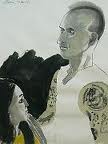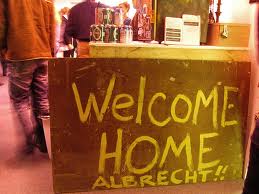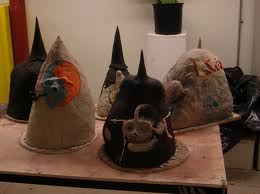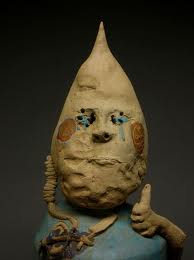An essay by Jesse Albrecht, who served as a combat medic in Mosel, Iraq, 2003-2004
“I don’t know why I left, but I left on my own, and it won’t be long
till-I, till-I, till-I get on back home…blood, guts, sex and danger I
wanna be an airborne ranger…hi ho didlley bob, wish I was back on the
block, with that bottle in my hand-I’m gonna be a drinking man, I’m
gonna drink all I can, for Uncle Sam–re-up you’re crazy, re-up you’re
outta your mind…”
This weekend I spent chain smoking cigarettes and drinking, talking
with a friend I served with in Iraq—he just returned from Afghanistan.
The point kept resurfacing of feeling great worth in a worthless
endeavor, and then feeling worthless upon returning home after a
deployment. When I returned from Iraq I felt like an alien here, Iraq
was my home, I had a purpose there, and all the continually fucked up
situations felt normal. Here the violence, aggression, and fear which
made me successful in Iraq continue to cause struggle and pain.
It is important to hear directly from the participants and the arts
provide form where the experience and its results can be remade into
something tangible. Something that allows the outsider
(non-combatants) a chance to feel a sliver of our emotions their tax
dollars paid for. It is vital to remove the spin from the combatants’
experiences.
The change started to resister for me when the Abu Ghraib pictures
surfaced and while I was disgusted like everyone else, I also
thought—well, shit, I would much prefer a naked pyramid any day of the
week over my head getting cut off and the video being posted on the
internet for the family to see…
But there are videos of American soldiers killing on the internet. The cycle starts and everything else falls away. Ideas of right and wrong are already conditioned out
of soldiers. Learning how to kill, wanting to kill, be rewarded for
it–having it be an honorable thing, is part of the training to become
a soldier. Seeing dead and blown apart Americans as a medic wore me
down and quickly. When we went out on security missions I hoped I
could kill who was trying to kill me. My thoughts, hopes, and dreams
of killing weren’t like the John Wayne myth, but an up close and
personal event, where I could watch someone’s head explode, either
from my bullets or buttstroke from my rifle caving their face in, or
maybe disemboweling them with my fighting knife I wore on my body
armor (without the ceramic plates that would stop bullets).
It is not the other that commits the atrocities that are part of the
war experience. It is people like me, an eagle scout, member of the
national honor society, my mother’s youngest son. It didn’t take me
very long to get to the place where I wanted to join the ranks of
atrocity, because it is the energy and essence of war, the most
beautiful and most horrible intertwined in a never ending knot. I
thank God I didn’t act on my thoughts, and now my thoughts can act on
me, and I act on those around me.
“Oh Mamma Mamma can’t you see, what this war has done to me…and it
won’t be long, till-I, till-I, till-I get on back home. “




